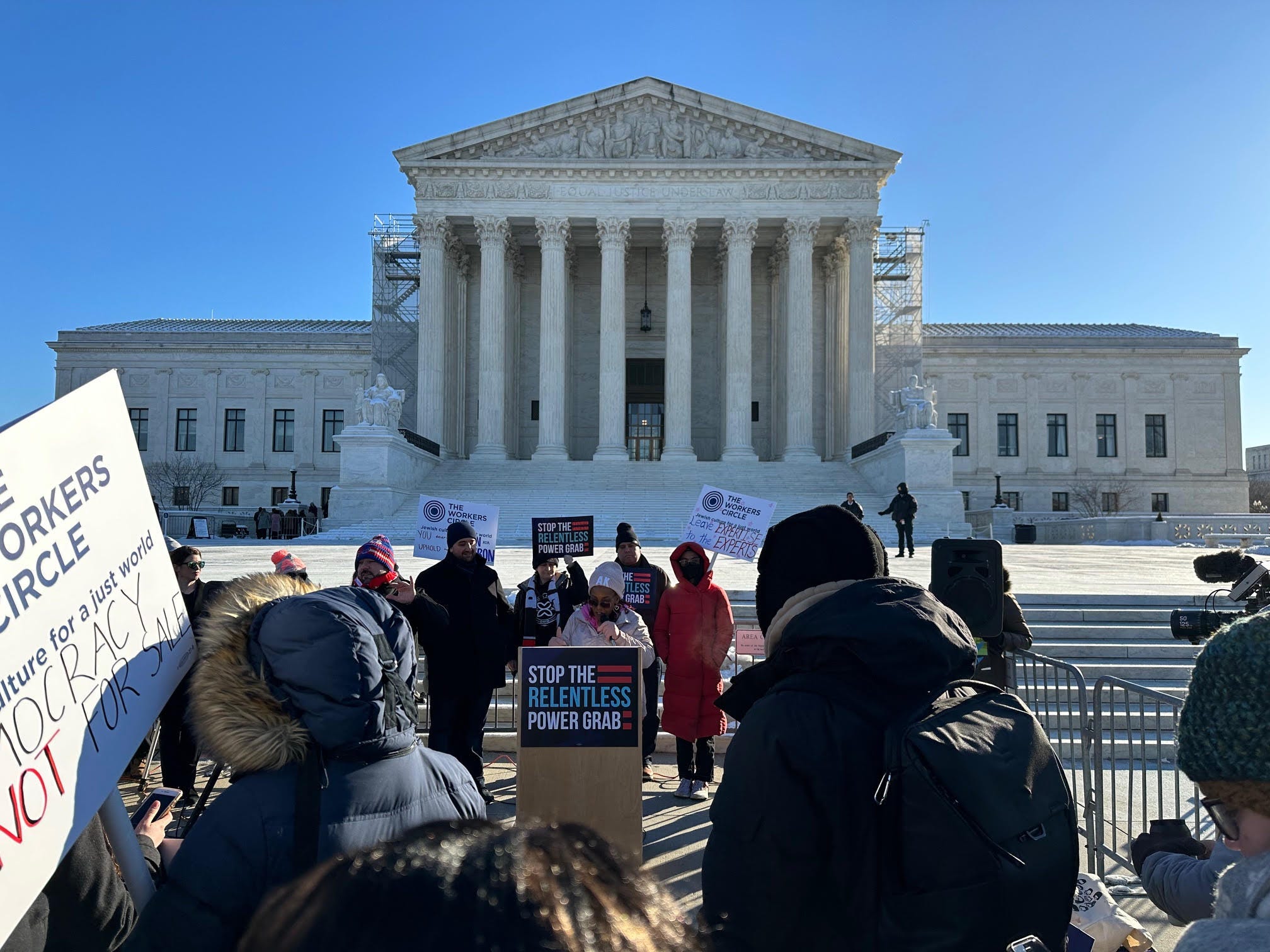Conservative justices, lawyers ready a path for ending agency deference
Justice Jackson suggested the move could give "policymaking" decisions to the courts — the concern that brought about Chevron deference in 1984.
In nearly four hours of arguments on Wednesday, the justices of the U.S. Supreme Court debated who should be deciding how are laws in our country are implemented. By the end of the arguments, the six-justice conservative majority appeared ready — some of the justices, eager — to jettison a 40-year old ruling that has courts defer to executive branch agencies’ interpretations of ambiguous laws when an agency’s interpretation is reasonable.
Instead, the argument goes, the courts should not need to defer to agencies and their expertise. It is an unworkable power grab that would upend federal administrative law — pushing power to the courts now that conservatives and business interests believe they are most likely to regularly find support from that branch.
The practical problem with this argument was most cleanly laid out by Justice Elena Kagan, who asked Roman Martinez, the Latham & Watkins partner arguing for one of the challengers, about when there’s a question about whether a new product supporting “healthy cholesterol levels” is a dietary supplement or a drug. “You want the courts to decide that?“
The lawyers for the challengers to the rule — Chevron deference, named after the 1984 case that laid out the rule — kept insisting that their problem was that the rule has resulted in the executive branch taking over the “interpretive” function, as Martinez said a half-dozen times.
It was one of the most disingenuous arguments I’ve seen at the Supreme Court. It’s nothing more than a rhetorical trick. You could just as easily refer to the actions in question as executive functions — a point that Justice Ketanji Brown Jackson made repeatedly in the first argument. (She recused herself from the second argument.)
“What I'm stuck on is what seems to be an assumption in your argument that every question posed with respect to interpreting a statute is a legal one,” Jackson told Martinez. “I see Chevron as doing the very important work of helping courts stay away from policymaking …. [H]elp me understand why, if we do away with Chevron's framework, we won't have a problem of courts actually making a policy decision.”
And while Martinez and Paul Clement, the former solicitor general in the George W. Bush administration and a partner at Clement & Murphy representing the other challengers, spent their two hours at the podium on Wednesday morning insisting that Chevron deference rests on a “fiction” that Congress is seeking to give this implementation authority to agencies when there is ambiguity in a statute, it was the lawyers’ own fictions that papered over the true aim of Wednesday’s argument.
“Judges are there not to exercise force or will,” Martinez insistently told the room. “They're there to exercise judgment. They’re serving as neutral umpires. They're not players on the field.”
These lawyers — and their supporters in and out of the court — are seeking a result that would dramatically alter how Congress must act if it’s seeking to legislate in an area, how and when the executive branch and its agencies are able to act, how courts get to act in response, and how private parties will act. All of this is being done under the guise of addressing whether the National Marine Fisheries Service can make companies pay for fishing monitors under the Magnuson-Stevens Act.
And, it all seems likely to work because Martinez and Clement had such a receptive audience.
Justice Neil Gorsuch aggressively attacked Chevron throughout the arguments, repeatedly cutting off Solicitor General Elizabeth Prelogar during her time at the podium to press how bad he thinks Chevron is.
He ended one particularly long back and forth by expressing concern that “Chevron has this disparate impact on different classes of persons” because “the immigrant, the veteran seeking his benefits, the Social Security Disability applicant” don’t have the ability “to influence agencies” — unlike “industry” officials.
Earlier on, he suggested that his approach instead would be, “Is the judge persuaded at the end of the day, with proper deference given to a coequal branch of government[?]” — a reference to a lesser deference, Skidmore deference, which some justices said wasn’t deference at all and which Kagan later said meant “nothing.” Gorsuch characterized Chevron, on the other hand, as meaning that “the judge abdicate[s] that responsibility and say[s] automatically whatever the agency says wins.”
This is not what Chevron says.
Nonetheless, Chief Justice John Roberts suggested in the second arguments that the Skidmore path was the path ahead, asking Clement, “[I]f Skidmore is going to occupy a more prominent role going forward, I'd like to know exactly what your understanding of that principle is.”
This is the disingenuous argument that went on for nearly four hours.
Justice Sam Alito had very targeted, friendly questions for the challengers that appeared to have been prepared in advance, asking Martinez and Clement both to give him a reason (other than the changed makeup of the federal courts and the Supreme Court) for why Chevron deference can be tossed now.
He raised the question by saying that Chevron was “so popular” initially because there was a “concern” that judges were “allowing their policy views … to influence their interpretation” of laws. Then, with a straight face, he asked, “Why was that fear unfounded? Why do you think now that the fear was unfounded?“
And though Justice Amy Coney Barrett asked questions around the edges, including about the consequences of overruling Chevron, she didn’t appear committed to maintaining Chevron, an important distinction that I see ending, at most, with her writing a concurring opinion addressing some of her concerns — not joining the Democratic appointees in trying to stop the conservatives.
Justice Brett Kavanaugh, meanwhile, focused on what he called the “shocks to the system” that Chevron “ushers in” when a new administration comes into office. Chevron, Kavanaugh suggested, creates mischief, saying that new administrations “have disagreement with the policy of the prior administration and they're using what Chevron gives them and what they can't get through Congress to do it themselves, self-help, and to do it themselves unilaterally, which is completely inconsistent with bicameralism and presentment to get your policy objectives enacted into law.”
This was an important point, one that helps pull together many strands of the conservative legal movement today. The goal, as I’ve written about previously, is to make it more difficult for Democrats, let alone progressives, to govern — even when that is what they’re elected to do.
If the court empowers an originalism that limits enforcement of constitutional protections based on a history and tradition test, it is making it more difficult for the Constitution to protect people as we learn new things and move forward as a nation. If the court creates rules like the major questions doctrine that prevent the executive branch from acting under existing laws when big new problems arise, it is limiting government’s ability to respond to those problems. If the court goes a step further, as the majority appeared ready to do Wednesday, and won’t even defer to agencies’ expertise in implementing any laws, they are hobbling the executive branch whenever it wants to do something that the conservative majority on the Supreme Court doesn’t think is the right move, big or small.
The combined import of these decisions was perhaps nowhere more clear than when Clement said, “I would have thought Congress might have addressed student loan forgiveness if that were really such an important issue to one party in Congress. … They don't get addressed because Chevron makes it so easy for them not to tackle the hard issues and forge a permanent solution.”
Clement was a top lawyer for the George W. Bush administration for virtually the whole administration, and represented the House of Representatives later in the Republicans’ defense of the Defense of Marriage Act. He is not the political novice this answer suggested. And yet, it was a helpful rhetorical trick in Wednesday’s argument — another fiction, from umpires to a functional Republican Party — used as an excuse for concentrating governmental power within the conservative judiciary.
Kagan is another former solicitor general like Clement — but one who went on to become a justice, unlike Clement — and yet it was she who was left arguing, “Judges should know what they don't know.”
A decision in the cases is expected by June.
This report was updated and expanded after initial publication, with the final update at 10:30 p.m.
Law Dork in the news
First up, Law Dork has been nominated for Outstanding Blog in the GLAAD Media Awards, alongside a number of other wonderful folks doing important work. Thanks to GLAAD for recognizing how much I’ve done here to focus on LGBTQ coverage in my work.
I also wanted to thank Adam Serwer for highlighting and recommending Law Dork on Al Franken’s podcast, as Serwer and Franken discussed his Atlantic piece about judges in a second Trump administration — and my writing on how the Supreme Court can use and has used extreme rulings from appeals courts to make it appear less conservative.





I'm sorry, I need to just set all the legal stuff aside for a second and say- how DARE the most partisan group of assholes on planet Earth pretend like they are fair arbiters of justice when they routinely ignore every truth they find inconvenient. I absolutely hate them.
The demise of Chevron deference will be absolutely devastating and serve to further erode the ability for necessary governmental institutions to be responsive to our societal needs and evolution.